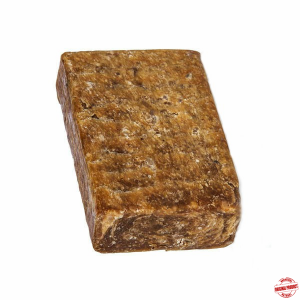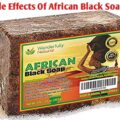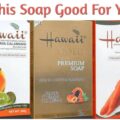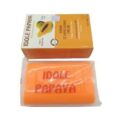Ghana black soap is a type of African black soap, also known by various local names such as sabulun salo in hausa, ose dudu in yoruba and ncha nkota in igbo. It is made from the ash of locally harvested African plants, which gives the soap its characteristic dark color. Black soap has become a popular toiletry product in North America. In West Africa, especially Ghana, black soap is often made by women using traditional recipes and is often exported through fair trade groups. Black soap has been found to have some antimicrobial properties against skin microbiota such as Staphylococcus aureus, Escherichia coli, and Candida albicans.
Ghana black soap ingredients and their Benefits
Black soap is generally made from locally harvested African plants such as plantain, cocoa pods, palm tree leaves, and shea tree bark. The ingredients are sun-dried and roasted, which is how it gets its deep color. Water and oils such as coconut, palm, and shea butter are then added. The ingredients found in this soap make it special and extremely beneficial for the skin. They are:
Plantain skin: Plantain peels are packed with nutrients “It contains high amounts of vitamin as well as magnesium and potassium. It also contains antioxidants, such as riboflavin, vitamin C, thiamine, and folic acid
Coconut Oil: Has anti-inflammatory properties and contains antioxidants that protect your skin from UV damage and prevent skin aging. It also keeps the skin moisturized and helps to heal wounds. The medium-chain fatty acids found in coconut oil also possess antimicrobial properties that can help treat acne and protect the skin from harmful bacteria.
Palm Kernel Oil: Palm kernel oil is a rich antioxidants agent that contains vitamin E. Vitamin E, coupled with the antioxidants properties in it, helps prevent the signs and symptoms of aging. Apart from being an anti-aging agent, palm kernel oil also helps in making the skin soft without the skin getting greasy in appearance.
Palm Oil: Palm oil is also a natural source of vitamins A, C, and E, which also have antioxidant properties. In fact, the vitamin E content of palm is so high that studies in Malaysia have led researchers to believe it to be a powerful treatment for skin conditions such as eczema, acne, and dermatitis.
Shea Butter: High concentrations of fatty acids and vitamins make shea butter an ideal cosmetic ingredient for softening skin. Shea butter also has anti-inflammatory and healing properties.
African black soap benefits
- It Helps In Soothing Irritated Skin
Dry or scaly patches, chapped skin, and other skin irritations can be unattractive and very uncomfortable. Irritated skin requires gentle care African black soap especially the Ghanaian version has a good reputation in clearing and soothing rashes and itching.
- It Has Antibacterial Properties
Natural antibacterial properties make African black soap an excellent alternative to chemical-laden cleansers. In fact, it may actually remove more bacteria than chemical cleansers do. Despite its strength, black soap is gentle enough to use on your face, hands, and body.
- It’s Safe To Use For All Skin Types
African black soap is considered to be safe and beneficial for all skin types—dry, oily, normal, combination, and even sensitive in some cases. For the most part, users of African black soap have found it to be beneficial, even healing to the skin. But while some find the soap moisturizing, others might find it drying.
- It Is A Great Natural Moisturizer For The Skin
As African black soap contains a concoction of various oils, along with shea butter, it is incredibly hydrating and beneficial for dry and combination skin types. It can be a miracle product. It’s a great deep pore cleanser as it’s a natural exfoliant. For some oily skin types, it can keep the skin hydrated without increasing oil.
5. It Fights Acne and Bumps
The soap cleanses gently, so it’s ideal for people with rosacea, rashes, dryness, and other skin conditions. African black soap contains plantain extract, which has antibacterial properties that is very effective in controlling the proliferation of Propionibacterium acnes, the bacteria that cause acne. Using African black soap can also help in preventing the bumps and infections that result from shaving and waxing your skin. READ: Can I Use K Brothers Papaya Soap On My Body?
6. It Helps In Reducing Hyperpigmentation
Hyperpigmentation is when patches of skin appear darker than the surrounding skin. Hyperpigmentation occurs when the skin produces more melanin, the pigment that gives skin its color. This can make spots or patches of skin appear darker than surrounding areas. African black soap contains shea butter that protects your skin from sun damage and minimizes dark spots and hyperpigmentation. See: Moroccan Bath Soap Benefits
7. It Has Antifungal Properties
More than half of people that visit beauty salons in the US regularly have reported skin and fungal diseases, according to Rutgers University. Fifty-two percent of people visiting salons at least three times in a year reported infections. The infections include skin rashes or nail disfigurements, researchers said. African black soap is a strong antifungal agent. It is very effective against several types of fungus, including Candida albicans (a type of yeast) that causes athlete’s foot, jock itch, and other skin infections
.
Possible side effects Of Using African Black Soap
Even with the best African black soap or raw African black soap from Ghana, some users have reported side effects. Some of the possible side effects to expect while using this product can include:
Allergic Skin Reaction
An allergic reaction occurs when cells in the immune system interpret a foreign substance or allergen as harmful. The immune system overreacts to these allergens and produces histamine, which is a chemical that causes allergy. People allergic to Ghana soap ingredients may become allergic to using African black soap. Symptoms and signs that you are allergic to what’s inside black soap include breathing difficulty, itchiness, tightening of the chest, and rash.
It Can very hydrating, and for some, it can be drying.
This often occurs because the soap draws out all the impurities and excess oil. Nevertheless, your skin usually balances itself within a few days. Many factors can interfere with the delicate balance of the skin’s acid. Most cleansers, including Ghana soap, tend to be too alkaline for the skin, as they strip away natural oils causing dryness and irritation.
Burning sensation and Peeling
The soap can also cause a tingling, sometimes burning sensation, leading to reddened skin. This also eventually resolves for most people, but before going full-throttle and using African black soap on your face, do a patch test on another part of your body. See: Moisturizer Withdrawal: Everything You Should Know






